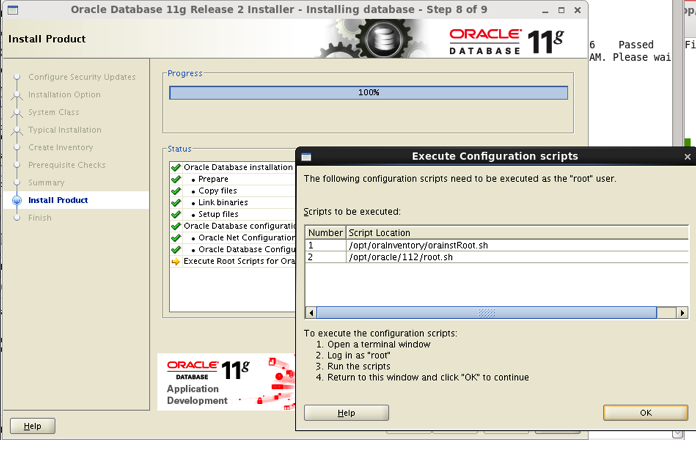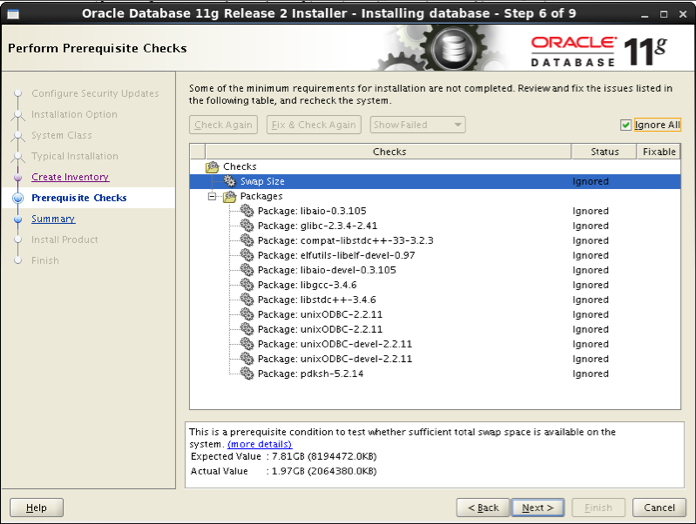Thus, whether or not your system is registered with ULN to access Oracle patches and support, you can use oracle-rdbms-servergR2-preinstall to simplify database installation on Oracle Linux. The amount of disk space needed in the file system varies according to the specific installation type, but roughly twice the size of the zip archives, or 5 GB, is enough to house the software and data files. The output in Listing 1 shows how the installation checks dependencies and then downloads and installs the required packages. On Oracle Linux, I discovered that there is a remarkably easy way to address these installation prerequisites: The Oracle Universal Installer performs a number of checks, verifying that the necessary OS packages and versions are installed. In some cases, you still might be able to continue with the database installation. Here is an excerpt of public-yum-ol6. 
| Uploader: | Tygorn |
| Date Added: | 19 August 2006 |
| File Size: | 15.59 Mb |
| Operating Systems: | Windows NT/2000/XP/2003/2003/7/8/10 MacOS 10/X |
| Downloads: | 1878 |
| Price: | Free* [*Free Regsitration Required] |
Oracle Linux 6 (x86_64) Update 8
Generally, installing oracle-validated takes care of the prerequisites so that you can proceed directly with installing the database. During the kernel settings check, the Installer might flag a few settings as "failed," and you should investigate these failures.

Here is an excerpt libaio-eevel-0.3.107 public-yum-ol6. The remainder of this article steps through the procedure that I used for installing oracle-rdbms-servergR2-preinstall on Oracle Linux via the Oracle public yum repository.
RPM resource libaio-devel(x)
First, I set up a yum configuration file that libaio-decel-0.3.107 to the correct repository, and then I installed the oracle-rdbms-servergR2-preinstall RPM from that repository. Be sure to review the appropriate Oracle Database installation guide to familiarize yourself with hardware, software, and operating system requirements.
This RPM performs a number of pre-configuration steps, including:. Before installing Oracle 11 g on a Linux system, you need to pre-configure the operating environment since the database requires certain software packages, package versions, and lbiaio-devel-0.3.107 to kernel parameters.
The Oracle Universal Installer performs a number of checks, verifying that the necessary OS packages and versions are installed.
Any pre-customized settings not related to database installation are left as is. On Oracle Linux, I discovered that there is a remarkably easy way to address these installation prerequisites: First install an RPM package called oracle-rdbms-servergR2-preinstall.
In some cases, you still might be able to continue with the database installation. In addition, it checks kernel parameters set by the oracle-validated installation.

And here are some libaio-xevel-0.3.107 resources from the Oracle Database Documentation Library http: The output in Listing 1 shows how the installation checks dependencies and then downloads and installs the required packages. The amount of disk space needed in the file system varies according to the specific installation type, but roughly twice the size of the zip archives, or 5 GB, is enough to house the software and data files. Here are the steps for pre-configuring a system for Oracle Database installation using oracle-rdbms-servergR2-preinstall:.
RPM Scientific Linux 6 libaio-devel x86_64 rpm
Keep in mind, however, that the Oracle public yum repository is not updated with security updates and bug fixes, so the best way to maintain up-to-date and secure systems is with a ULN subscription.
Thus, whether or not your system is registered with ULN to access Oracle patches and support, you can use oracle-rdbms-servergR2-preinstall to simplify database installation on Oracle Linux. The Oracle Universal Installer performs additional checks, such as verifying the glibc version, sufficient disk space, environmental variable and path settings, and sufficient physical memory and swap space.

No comments:
Post a Comment